The Psychology of Gratitude: Human Behavior Literature Review
VerifiedAdded on 2021/05/30
|9
|2218
|402
Literature Review
AI Summary
This literature review delves into the multifaceted role of gratitude in human behavior, drawing from various psychological perspectives. It examines how gratitude, conceptualized as both an emotion and a characteristic, influences subjective well-being, encompassing positive emotions, engagement, relationships, meaning, and accomplishment. The review highlights the positive impacts of gratitude interventions on mental health, social relationships, and physical health, including improved sleep quality and reduced stress and anxiety. It explores gratitude's application in diverse contexts, such as parenting children with autism spectrum disorder, and discusses cognitive-behavioral and therapeutic approaches to cultivate gratitude. The review emphasizes the importance of gratitude in enhancing life satisfaction, reducing mental disorders, and fostering overall well-being across different populations. The study references several research papers to support the claims made in the literature review.
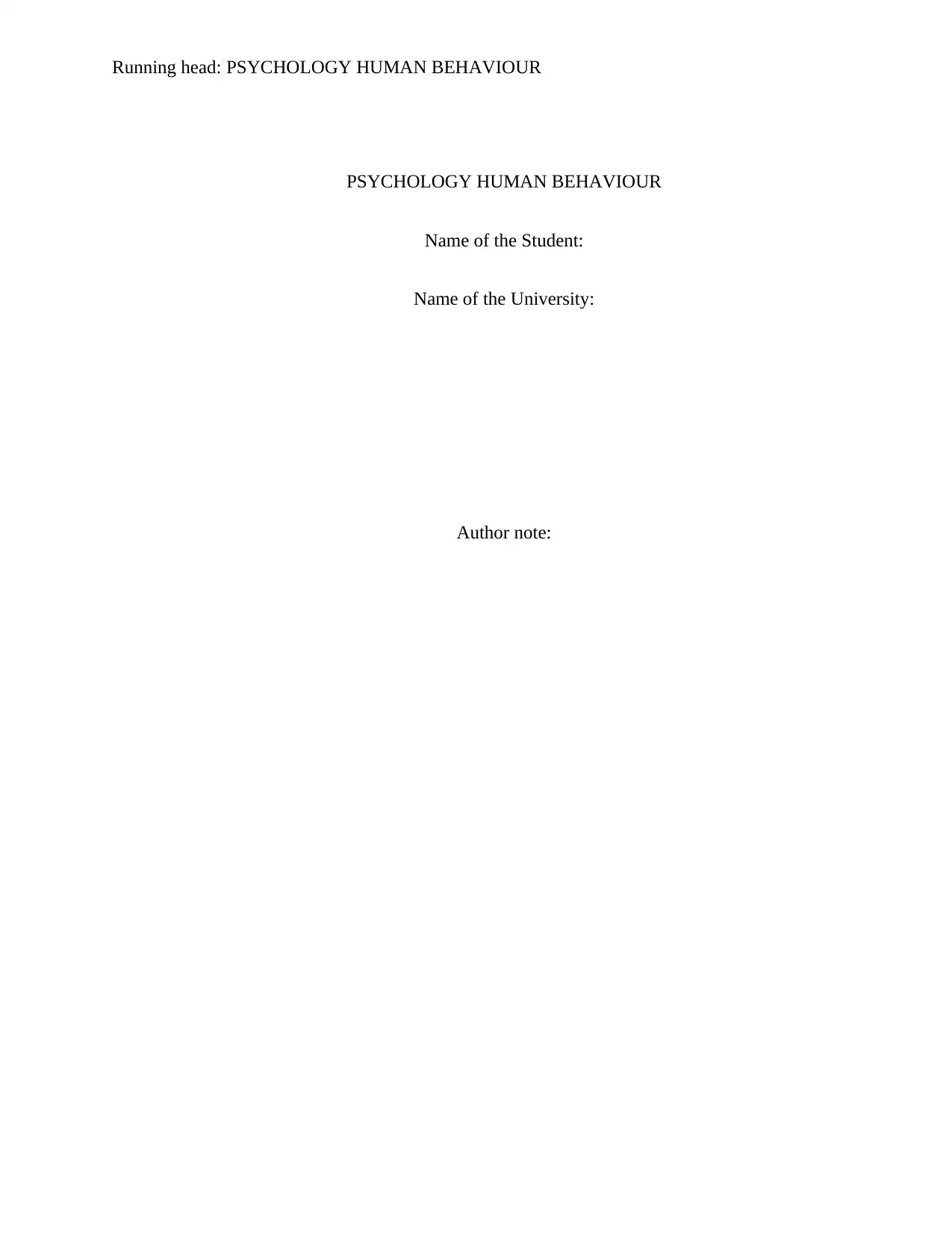
Running head: PSYCHOLOGY HUMAN BEHAVIOUR
PSYCHOLOGY HUMAN BEHAVIOUR
Name of the Student:
Name of the University:
Author note:
PSYCHOLOGY HUMAN BEHAVIOUR
Name of the Student:
Name of the University:
Author note:
Paraphrase This Document
Need a fresh take? Get an instant paraphrase of this document with our AI Paraphraser
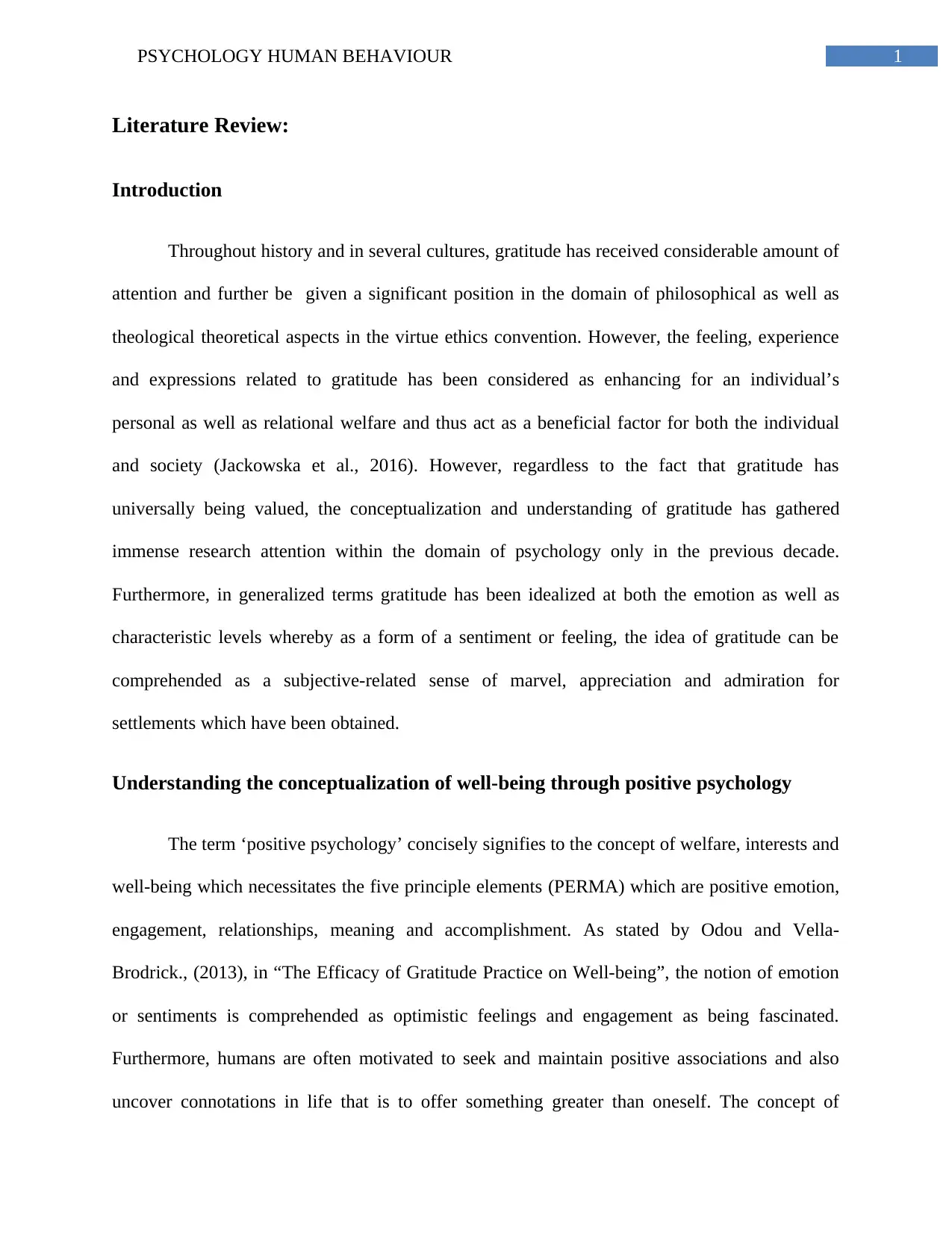
1PSYCHOLOGY HUMAN BEHAVIOUR
Literature Review:
Introduction
Throughout history and in several cultures, gratitude has received considerable amount of
attention and further be given a significant position in the domain of philosophical as well as
theological theoretical aspects in the virtue ethics convention. However, the feeling, experience
and expressions related to gratitude has been considered as enhancing for an individual’s
personal as well as relational welfare and thus act as a beneficial factor for both the individual
and society (Jackowska et al., 2016). However, regardless to the fact that gratitude has
universally being valued, the conceptualization and understanding of gratitude has gathered
immense research attention within the domain of psychology only in the previous decade.
Furthermore, in generalized terms gratitude has been idealized at both the emotion as well as
characteristic levels whereby as a form of a sentiment or feeling, the idea of gratitude can be
comprehended as a subjective-related sense of marvel, appreciation and admiration for
settlements which have been obtained.
Understanding the conceptualization of well-being through positive psychology
The term ‘positive psychology’ concisely signifies to the concept of welfare, interests and
well-being which necessitates the five principle elements (PERMA) which are positive emotion,
engagement, relationships, meaning and accomplishment. As stated by Odou and Vella-
Brodrick., (2013), in “The Efficacy of Gratitude Practice on Well-being”, the notion of emotion
or sentiments is comprehended as optimistic feelings and engagement as being fascinated.
Furthermore, humans are often motivated to seek and maintain positive associations and also
uncover connotations in life that is to offer something greater than oneself. The concept of
Literature Review:
Introduction
Throughout history and in several cultures, gratitude has received considerable amount of
attention and further be given a significant position in the domain of philosophical as well as
theological theoretical aspects in the virtue ethics convention. However, the feeling, experience
and expressions related to gratitude has been considered as enhancing for an individual’s
personal as well as relational welfare and thus act as a beneficial factor for both the individual
and society (Jackowska et al., 2016). However, regardless to the fact that gratitude has
universally being valued, the conceptualization and understanding of gratitude has gathered
immense research attention within the domain of psychology only in the previous decade.
Furthermore, in generalized terms gratitude has been idealized at both the emotion as well as
characteristic levels whereby as a form of a sentiment or feeling, the idea of gratitude can be
comprehended as a subjective-related sense of marvel, appreciation and admiration for
settlements which have been obtained.
Understanding the conceptualization of well-being through positive psychology
The term ‘positive psychology’ concisely signifies to the concept of welfare, interests and
well-being which necessitates the five principle elements (PERMA) which are positive emotion,
engagement, relationships, meaning and accomplishment. As stated by Odou and Vella-
Brodrick., (2013), in “The Efficacy of Gratitude Practice on Well-being”, the notion of emotion
or sentiments is comprehended as optimistic feelings and engagement as being fascinated.
Furthermore, humans are often motivated to seek and maintain positive associations and also
uncover connotations in life that is to offer something greater than oneself. The concept of
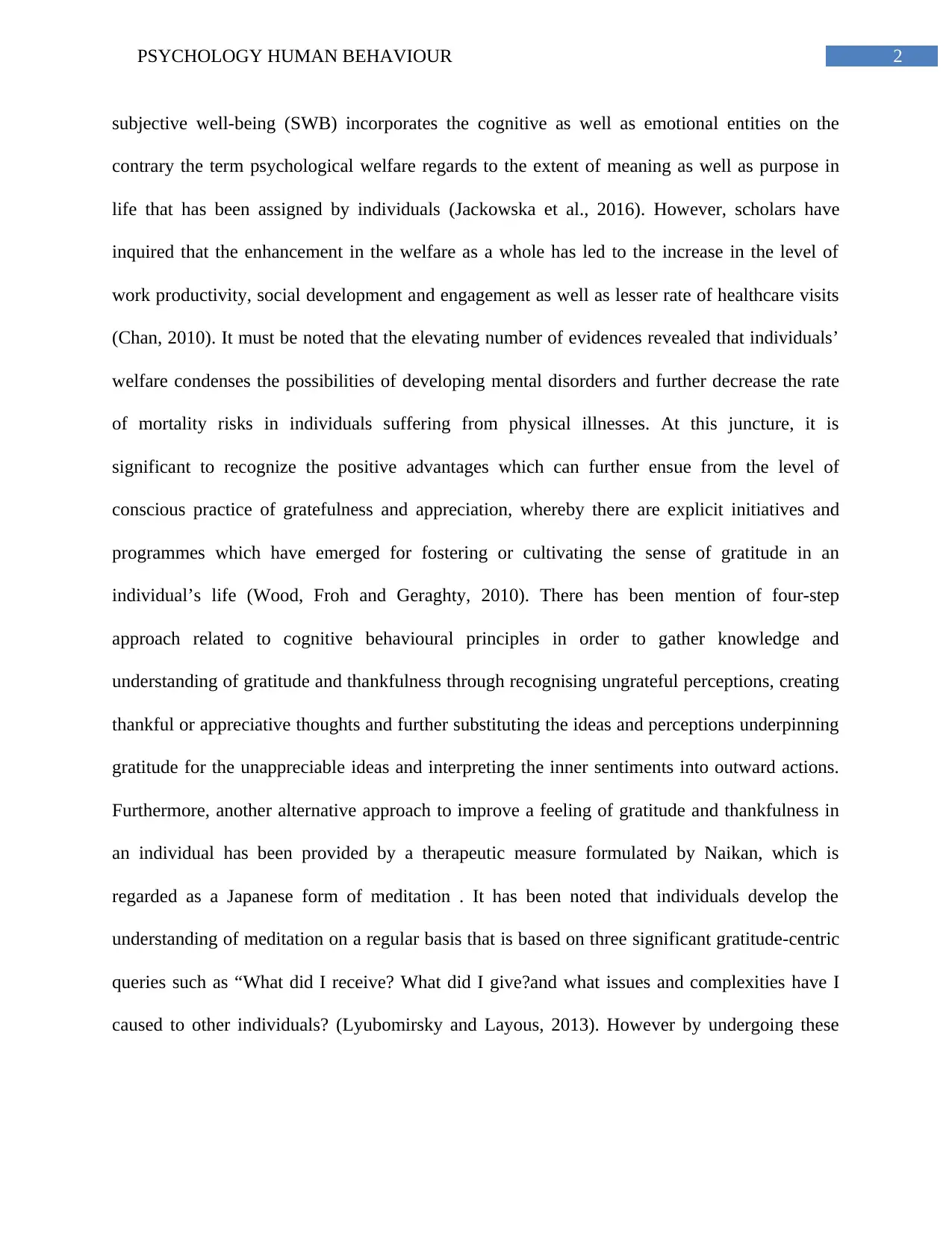
2PSYCHOLOGY HUMAN BEHAVIOUR
subjective well-being (SWB) incorporates the cognitive as well as emotional entities on the
contrary the term psychological welfare regards to the extent of meaning as well as purpose in
life that has been assigned by individuals (Jackowska et al., 2016). However, scholars have
inquired that the enhancement in the welfare as a whole has led to the increase in the level of
work productivity, social development and engagement as well as lesser rate of healthcare visits
(Chan, 2010). It must be noted that the elevating number of evidences revealed that individuals’
welfare condenses the possibilities of developing mental disorders and further decrease the rate
of mortality risks in individuals suffering from physical illnesses. At this juncture, it is
significant to recognize the positive advantages which can further ensue from the level of
conscious practice of gratefulness and appreciation, whereby there are explicit initiatives and
programmes which have emerged for fostering or cultivating the sense of gratitude in an
individual’s life (Wood, Froh and Geraghty, 2010). There has been mention of four-step
approach related to cognitive behavioural principles in order to gather knowledge and
understanding of gratitude and thankfulness through recognising ungrateful perceptions, creating
thankful or appreciative thoughts and further substituting the ideas and perceptions underpinning
gratitude for the unappreciable ideas and interpreting the inner sentiments into outward actions.
Furthermore, another alternative approach to improve a feeling of gratitude and thankfulness in
an individual has been provided by a therapeutic measure formulated by Naikan, which is
regarded as a Japanese form of meditation . It has been noted that individuals develop the
understanding of meditation on a regular basis that is based on three significant gratitude-centric
queries such as “What did I receive? What did I give?and what issues and complexities have I
caused to other individuals? (Lyubomirsky and Layous, 2013). However by undergoing these
subjective well-being (SWB) incorporates the cognitive as well as emotional entities on the
contrary the term psychological welfare regards to the extent of meaning as well as purpose in
life that has been assigned by individuals (Jackowska et al., 2016). However, scholars have
inquired that the enhancement in the welfare as a whole has led to the increase in the level of
work productivity, social development and engagement as well as lesser rate of healthcare visits
(Chan, 2010). It must be noted that the elevating number of evidences revealed that individuals’
welfare condenses the possibilities of developing mental disorders and further decrease the rate
of mortality risks in individuals suffering from physical illnesses. At this juncture, it is
significant to recognize the positive advantages which can further ensue from the level of
conscious practice of gratefulness and appreciation, whereby there are explicit initiatives and
programmes which have emerged for fostering or cultivating the sense of gratitude in an
individual’s life (Wood, Froh and Geraghty, 2010). There has been mention of four-step
approach related to cognitive behavioural principles in order to gather knowledge and
understanding of gratitude and thankfulness through recognising ungrateful perceptions, creating
thankful or appreciative thoughts and further substituting the ideas and perceptions underpinning
gratitude for the unappreciable ideas and interpreting the inner sentiments into outward actions.
Furthermore, another alternative approach to improve a feeling of gratitude and thankfulness in
an individual has been provided by a therapeutic measure formulated by Naikan, which is
regarded as a Japanese form of meditation . It has been noted that individuals develop the
understanding of meditation on a regular basis that is based on three significant gratitude-centric
queries such as “What did I receive? What did I give?and what issues and complexities have I
caused to other individuals? (Lyubomirsky and Layous, 2013). However by undergoing these
⊘ This is a preview!⊘
Do you want full access?
Subscribe today to unlock all pages.

Trusted by 1+ million students worldwide
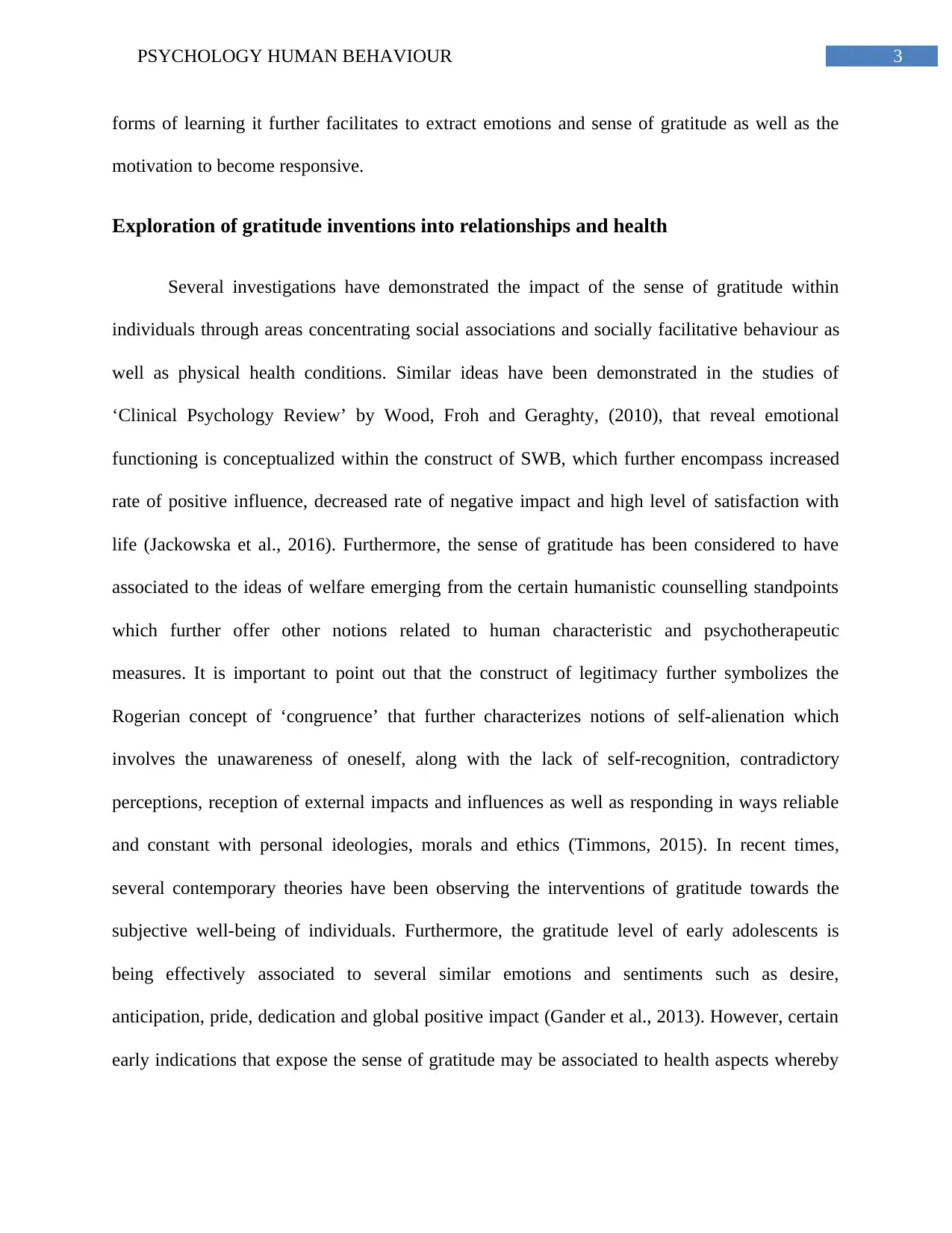
3PSYCHOLOGY HUMAN BEHAVIOUR
forms of learning it further facilitates to extract emotions and sense of gratitude as well as the
motivation to become responsive.
Exploration of gratitude inventions into relationships and health
Several investigations have demonstrated the impact of the sense of gratitude within
individuals through areas concentrating social associations and socially facilitative behaviour as
well as physical health conditions. Similar ideas have been demonstrated in the studies of
‘Clinical Psychology Review’ by Wood, Froh and Geraghty, (2010), that reveal emotional
functioning is conceptualized within the construct of SWB, which further encompass increased
rate of positive influence, decreased rate of negative impact and high level of satisfaction with
life (Jackowska et al., 2016). Furthermore, the sense of gratitude has been considered to have
associated to the ideas of welfare emerging from the certain humanistic counselling standpoints
which further offer other notions related to human characteristic and psychotherapeutic
measures. It is important to point out that the construct of legitimacy further symbolizes the
Rogerian concept of ‘congruence’ that further characterizes notions of self-alienation which
involves the unawareness of oneself, along with the lack of self-recognition, contradictory
perceptions, reception of external impacts and influences as well as responding in ways reliable
and constant with personal ideologies, morals and ethics (Timmons, 2015). In recent times,
several contemporary theories have been observing the interventions of gratitude towards the
subjective well-being of individuals. Furthermore, the gratitude level of early adolescents is
being effectively associated to several similar emotions and sentiments such as desire,
anticipation, pride, dedication and global positive impact (Gander et al., 2013). However, certain
early indications that expose the sense of gratitude may be associated to health aspects whereby
forms of learning it further facilitates to extract emotions and sense of gratitude as well as the
motivation to become responsive.
Exploration of gratitude inventions into relationships and health
Several investigations have demonstrated the impact of the sense of gratitude within
individuals through areas concentrating social associations and socially facilitative behaviour as
well as physical health conditions. Similar ideas have been demonstrated in the studies of
‘Clinical Psychology Review’ by Wood, Froh and Geraghty, (2010), that reveal emotional
functioning is conceptualized within the construct of SWB, which further encompass increased
rate of positive influence, decreased rate of negative impact and high level of satisfaction with
life (Jackowska et al., 2016). Furthermore, the sense of gratitude has been considered to have
associated to the ideas of welfare emerging from the certain humanistic counselling standpoints
which further offer other notions related to human characteristic and psychotherapeutic
measures. It is important to point out that the construct of legitimacy further symbolizes the
Rogerian concept of ‘congruence’ that further characterizes notions of self-alienation which
involves the unawareness of oneself, along with the lack of self-recognition, contradictory
perceptions, reception of external impacts and influences as well as responding in ways reliable
and constant with personal ideologies, morals and ethics (Timmons, 2015). In recent times,
several contemporary theories have been observing the interventions of gratitude towards the
subjective well-being of individuals. Furthermore, the gratitude level of early adolescents is
being effectively associated to several similar emotions and sentiments such as desire,
anticipation, pride, dedication and global positive impact (Gander et al., 2013). However, certain
early indications that expose the sense of gratitude may be associated to health aspects whereby
Paraphrase This Document
Need a fresh take? Get an instant paraphrase of this document with our AI Paraphraser
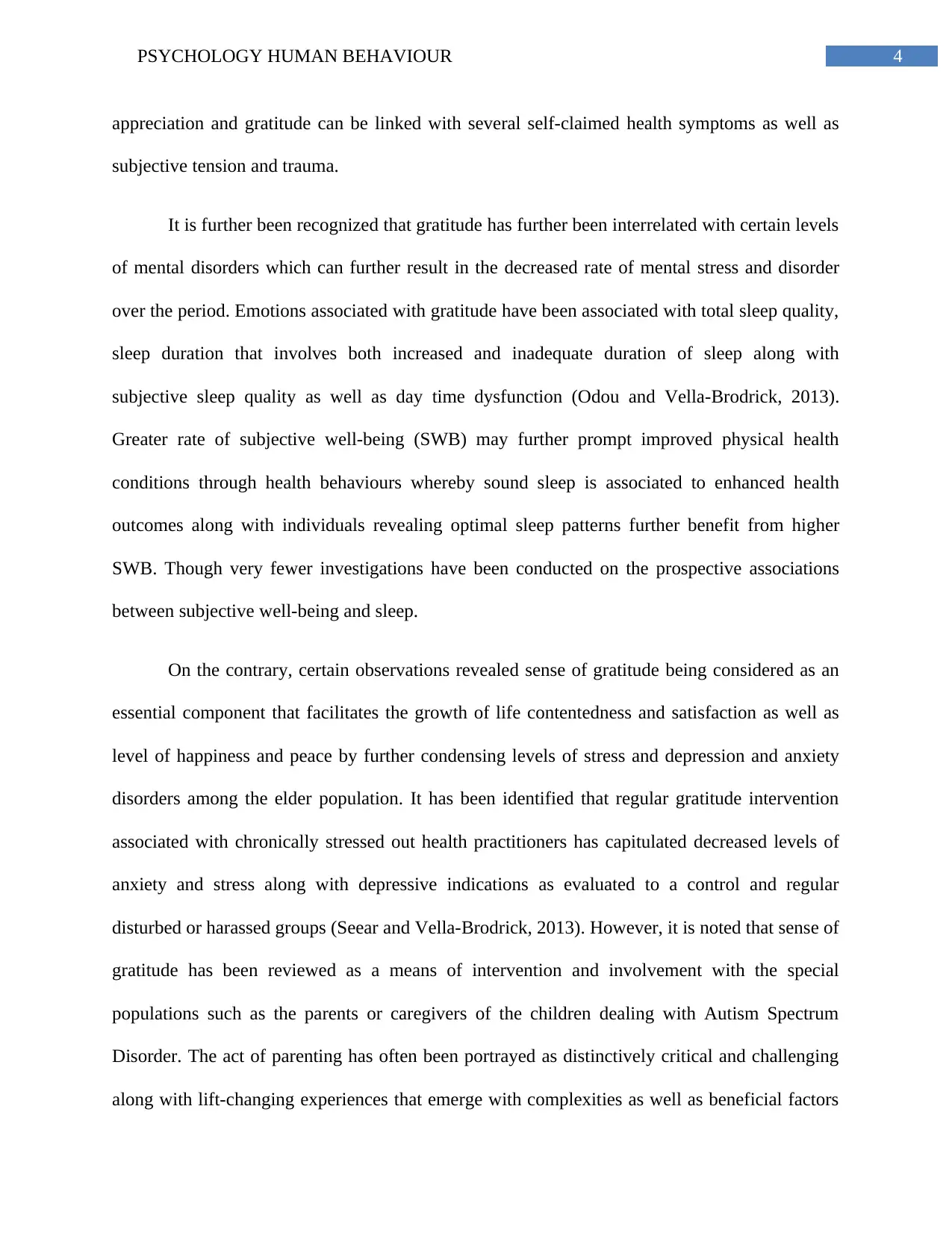
4PSYCHOLOGY HUMAN BEHAVIOUR
appreciation and gratitude can be linked with several self-claimed health symptoms as well as
subjective tension and trauma.
It is further been recognized that gratitude has further been interrelated with certain levels
of mental disorders which can further result in the decreased rate of mental stress and disorder
over the period. Emotions associated with gratitude have been associated with total sleep quality,
sleep duration that involves both increased and inadequate duration of sleep along with
subjective sleep quality as well as day time dysfunction (Odou and Vella-Brodrick, 2013).
Greater rate of subjective well-being (SWB) may further prompt improved physical health
conditions through health behaviours whereby sound sleep is associated to enhanced health
outcomes along with individuals revealing optimal sleep patterns further benefit from higher
SWB. Though very fewer investigations have been conducted on the prospective associations
between subjective well-being and sleep.
On the contrary, certain observations revealed sense of gratitude being considered as an
essential component that facilitates the growth of life contentedness and satisfaction as well as
level of happiness and peace by further condensing levels of stress and depression and anxiety
disorders among the elder population. It has been identified that regular gratitude intervention
associated with chronically stressed out health practitioners has capitulated decreased levels of
anxiety and stress along with depressive indications as evaluated to a control and regular
disturbed or harassed groups (Seear and Vella-Brodrick, 2013). However, it is noted that sense of
gratitude has been reviewed as a means of intervention and involvement with the special
populations such as the parents or caregivers of the children dealing with Autism Spectrum
Disorder. The act of parenting has often been portrayed as distinctively critical and challenging
along with lift-changing experiences that emerge with complexities as well as beneficial factors
appreciation and gratitude can be linked with several self-claimed health symptoms as well as
subjective tension and trauma.
It is further been recognized that gratitude has further been interrelated with certain levels
of mental disorders which can further result in the decreased rate of mental stress and disorder
over the period. Emotions associated with gratitude have been associated with total sleep quality,
sleep duration that involves both increased and inadequate duration of sleep along with
subjective sleep quality as well as day time dysfunction (Odou and Vella-Brodrick, 2013).
Greater rate of subjective well-being (SWB) may further prompt improved physical health
conditions through health behaviours whereby sound sleep is associated to enhanced health
outcomes along with individuals revealing optimal sleep patterns further benefit from higher
SWB. Though very fewer investigations have been conducted on the prospective associations
between subjective well-being and sleep.
On the contrary, certain observations revealed sense of gratitude being considered as an
essential component that facilitates the growth of life contentedness and satisfaction as well as
level of happiness and peace by further condensing levels of stress and depression and anxiety
disorders among the elder population. It has been identified that regular gratitude intervention
associated with chronically stressed out health practitioners has capitulated decreased levels of
anxiety and stress along with depressive indications as evaluated to a control and regular
disturbed or harassed groups (Seear and Vella-Brodrick, 2013). However, it is noted that sense of
gratitude has been reviewed as a means of intervention and involvement with the special
populations such as the parents or caregivers of the children dealing with Autism Spectrum
Disorder. The act of parenting has often been portrayed as distinctively critical and challenging
along with lift-changing experiences that emerge with complexities as well as beneficial factors
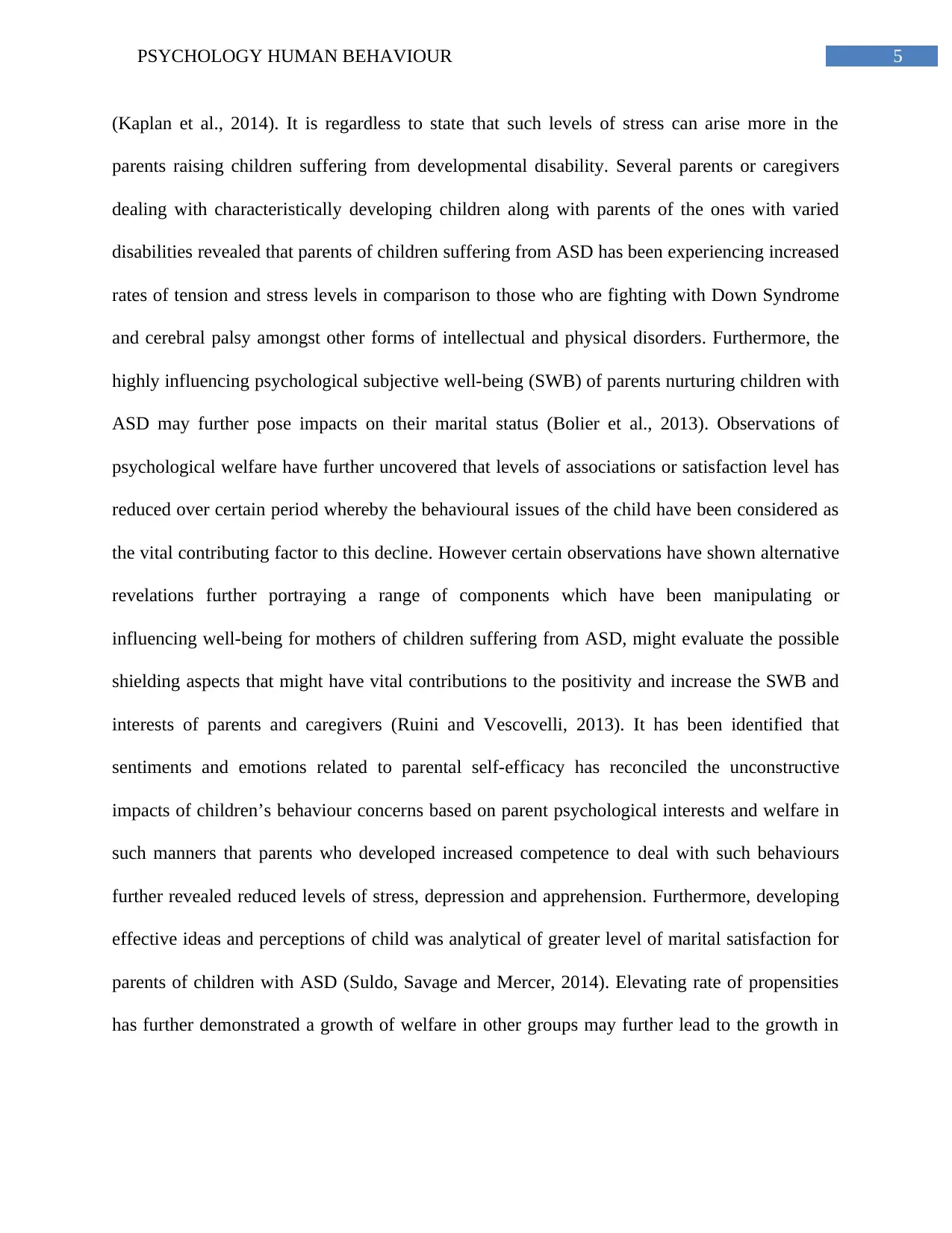
5PSYCHOLOGY HUMAN BEHAVIOUR
(Kaplan et al., 2014). It is regardless to state that such levels of stress can arise more in the
parents raising children suffering from developmental disability. Several parents or caregivers
dealing with characteristically developing children along with parents of the ones with varied
disabilities revealed that parents of children suffering from ASD has been experiencing increased
rates of tension and stress levels in comparison to those who are fighting with Down Syndrome
and cerebral palsy amongst other forms of intellectual and physical disorders. Furthermore, the
highly influencing psychological subjective well-being (SWB) of parents nurturing children with
ASD may further pose impacts on their marital status (Bolier et al., 2013). Observations of
psychological welfare have further uncovered that levels of associations or satisfaction level has
reduced over certain period whereby the behavioural issues of the child have been considered as
the vital contributing factor to this decline. However certain observations have shown alternative
revelations further portraying a range of components which have been manipulating or
influencing well-being for mothers of children suffering from ASD, might evaluate the possible
shielding aspects that might have vital contributions to the positivity and increase the SWB and
interests of parents and caregivers (Ruini and Vescovelli, 2013). It has been identified that
sentiments and emotions related to parental self-efficacy has reconciled the unconstructive
impacts of children’s behaviour concerns based on parent psychological interests and welfare in
such manners that parents who developed increased competence to deal with such behaviours
further revealed reduced levels of stress, depression and apprehension. Furthermore, developing
effective ideas and perceptions of child was analytical of greater level of marital satisfaction for
parents of children with ASD (Suldo, Savage and Mercer, 2014). Elevating rate of propensities
has further demonstrated a growth of welfare in other groups may further lead to the growth in
(Kaplan et al., 2014). It is regardless to state that such levels of stress can arise more in the
parents raising children suffering from developmental disability. Several parents or caregivers
dealing with characteristically developing children along with parents of the ones with varied
disabilities revealed that parents of children suffering from ASD has been experiencing increased
rates of tension and stress levels in comparison to those who are fighting with Down Syndrome
and cerebral palsy amongst other forms of intellectual and physical disorders. Furthermore, the
highly influencing psychological subjective well-being (SWB) of parents nurturing children with
ASD may further pose impacts on their marital status (Bolier et al., 2013). Observations of
psychological welfare have further uncovered that levels of associations or satisfaction level has
reduced over certain period whereby the behavioural issues of the child have been considered as
the vital contributing factor to this decline. However certain observations have shown alternative
revelations further portraying a range of components which have been manipulating or
influencing well-being for mothers of children suffering from ASD, might evaluate the possible
shielding aspects that might have vital contributions to the positivity and increase the SWB and
interests of parents and caregivers (Ruini and Vescovelli, 2013). It has been identified that
sentiments and emotions related to parental self-efficacy has reconciled the unconstructive
impacts of children’s behaviour concerns based on parent psychological interests and welfare in
such manners that parents who developed increased competence to deal with such behaviours
further revealed reduced levels of stress, depression and apprehension. Furthermore, developing
effective ideas and perceptions of child was analytical of greater level of marital satisfaction for
parents of children with ASD (Suldo, Savage and Mercer, 2014). Elevating rate of propensities
has further demonstrated a growth of welfare in other groups may further lead to the growth in
⊘ This is a preview!⊘
Do you want full access?
Subscribe today to unlock all pages.

Trusted by 1+ million students worldwide
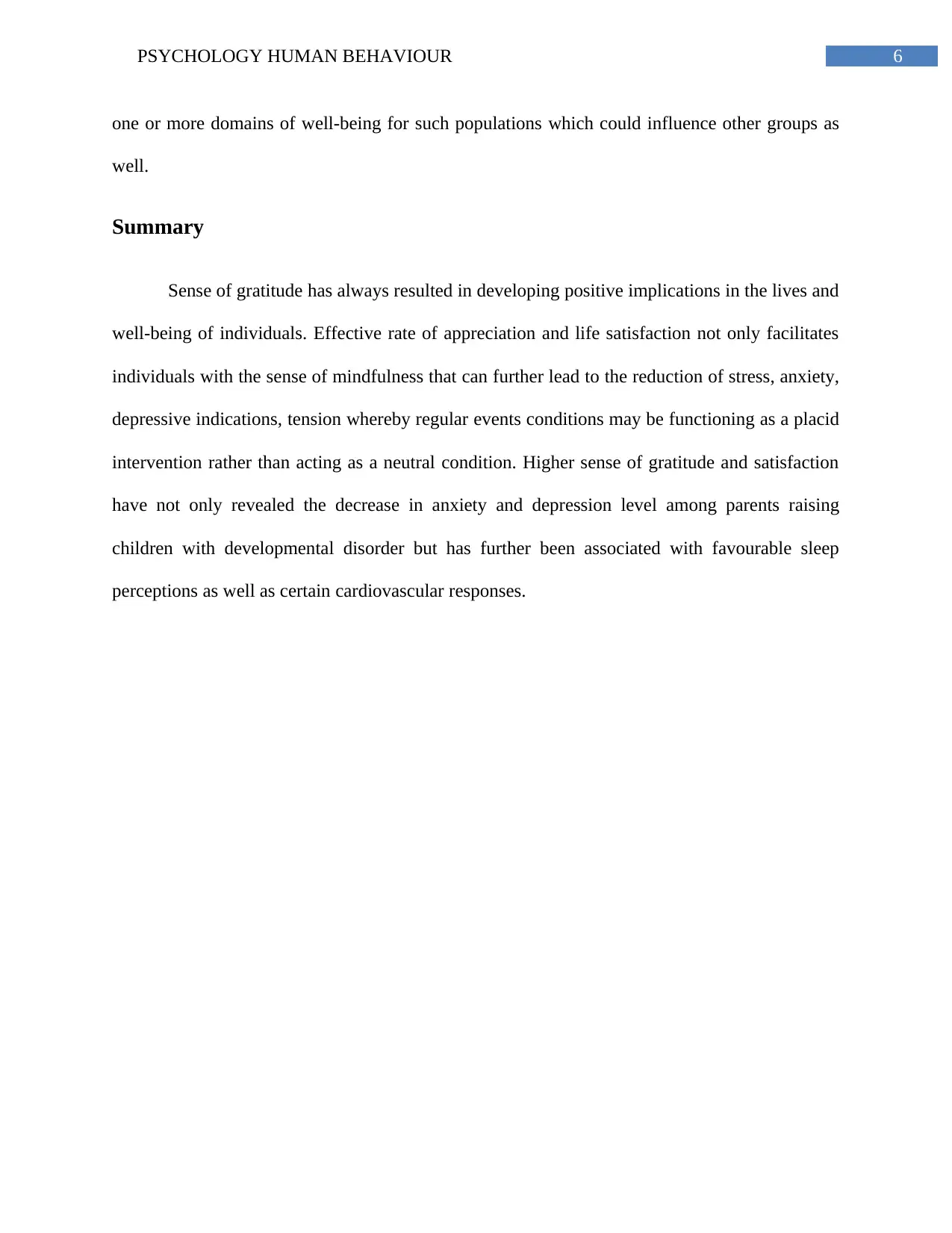
6PSYCHOLOGY HUMAN BEHAVIOUR
one or more domains of well-being for such populations which could influence other groups as
well.
Summary
Sense of gratitude has always resulted in developing positive implications in the lives and
well-being of individuals. Effective rate of appreciation and life satisfaction not only facilitates
individuals with the sense of mindfulness that can further lead to the reduction of stress, anxiety,
depressive indications, tension whereby regular events conditions may be functioning as a placid
intervention rather than acting as a neutral condition. Higher sense of gratitude and satisfaction
have not only revealed the decrease in anxiety and depression level among parents raising
children with developmental disorder but has further been associated with favourable sleep
perceptions as well as certain cardiovascular responses.
one or more domains of well-being for such populations which could influence other groups as
well.
Summary
Sense of gratitude has always resulted in developing positive implications in the lives and
well-being of individuals. Effective rate of appreciation and life satisfaction not only facilitates
individuals with the sense of mindfulness that can further lead to the reduction of stress, anxiety,
depressive indications, tension whereby regular events conditions may be functioning as a placid
intervention rather than acting as a neutral condition. Higher sense of gratitude and satisfaction
have not only revealed the decrease in anxiety and depression level among parents raising
children with developmental disorder but has further been associated with favourable sleep
perceptions as well as certain cardiovascular responses.
Paraphrase This Document
Need a fresh take? Get an instant paraphrase of this document with our AI Paraphraser
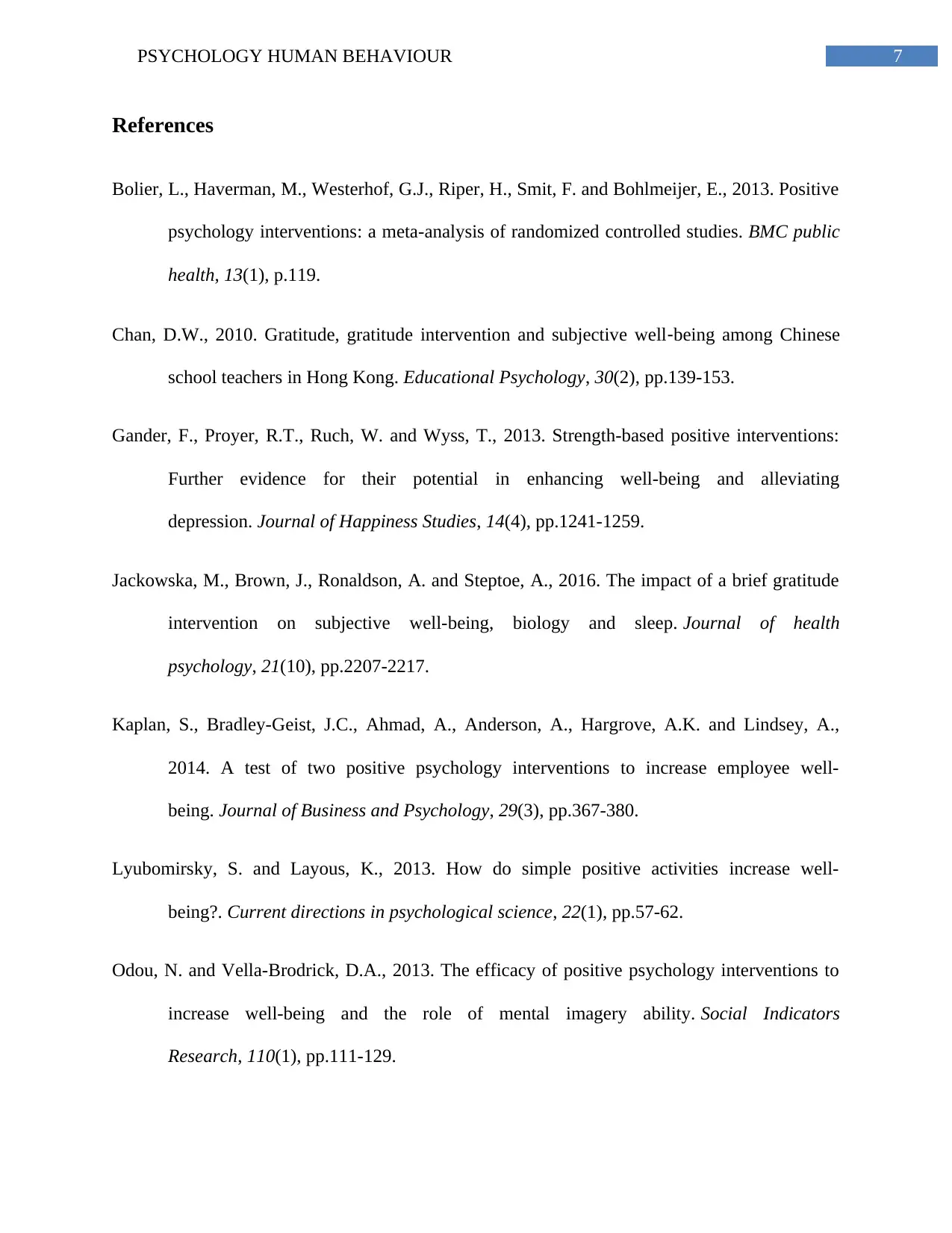
7PSYCHOLOGY HUMAN BEHAVIOUR
References
Bolier, L., Haverman, M., Westerhof, G.J., Riper, H., Smit, F. and Bohlmeijer, E., 2013. Positive
psychology interventions: a meta-analysis of randomized controlled studies. BMC public
health, 13(1), p.119.
Chan, D.W., 2010. Gratitude, gratitude intervention and subjective well‐being among Chinese
school teachers in Hong Kong. Educational Psychology, 30(2), pp.139-153.
Gander, F., Proyer, R.T., Ruch, W. and Wyss, T., 2013. Strength-based positive interventions:
Further evidence for their potential in enhancing well-being and alleviating
depression. Journal of Happiness Studies, 14(4), pp.1241-1259.
Jackowska, M., Brown, J., Ronaldson, A. and Steptoe, A., 2016. The impact of a brief gratitude
intervention on subjective well-being, biology and sleep. Journal of health
psychology, 21(10), pp.2207-2217.
Kaplan, S., Bradley-Geist, J.C., Ahmad, A., Anderson, A., Hargrove, A.K. and Lindsey, A.,
2014. A test of two positive psychology interventions to increase employee well-
being. Journal of Business and Psychology, 29(3), pp.367-380.
Lyubomirsky, S. and Layous, K., 2013. How do simple positive activities increase well-
being?. Current directions in psychological science, 22(1), pp.57-62.
Odou, N. and Vella-Brodrick, D.A., 2013. The efficacy of positive psychology interventions to
increase well-being and the role of mental imagery ability. Social Indicators
Research, 110(1), pp.111-129.
References
Bolier, L., Haverman, M., Westerhof, G.J., Riper, H., Smit, F. and Bohlmeijer, E., 2013. Positive
psychology interventions: a meta-analysis of randomized controlled studies. BMC public
health, 13(1), p.119.
Chan, D.W., 2010. Gratitude, gratitude intervention and subjective well‐being among Chinese
school teachers in Hong Kong. Educational Psychology, 30(2), pp.139-153.
Gander, F., Proyer, R.T., Ruch, W. and Wyss, T., 2013. Strength-based positive interventions:
Further evidence for their potential in enhancing well-being and alleviating
depression. Journal of Happiness Studies, 14(4), pp.1241-1259.
Jackowska, M., Brown, J., Ronaldson, A. and Steptoe, A., 2016. The impact of a brief gratitude
intervention on subjective well-being, biology and sleep. Journal of health
psychology, 21(10), pp.2207-2217.
Kaplan, S., Bradley-Geist, J.C., Ahmad, A., Anderson, A., Hargrove, A.K. and Lindsey, A.,
2014. A test of two positive psychology interventions to increase employee well-
being. Journal of Business and Psychology, 29(3), pp.367-380.
Lyubomirsky, S. and Layous, K., 2013. How do simple positive activities increase well-
being?. Current directions in psychological science, 22(1), pp.57-62.
Odou, N. and Vella-Brodrick, D.A., 2013. The efficacy of positive psychology interventions to
increase well-being and the role of mental imagery ability. Social Indicators
Research, 110(1), pp.111-129.
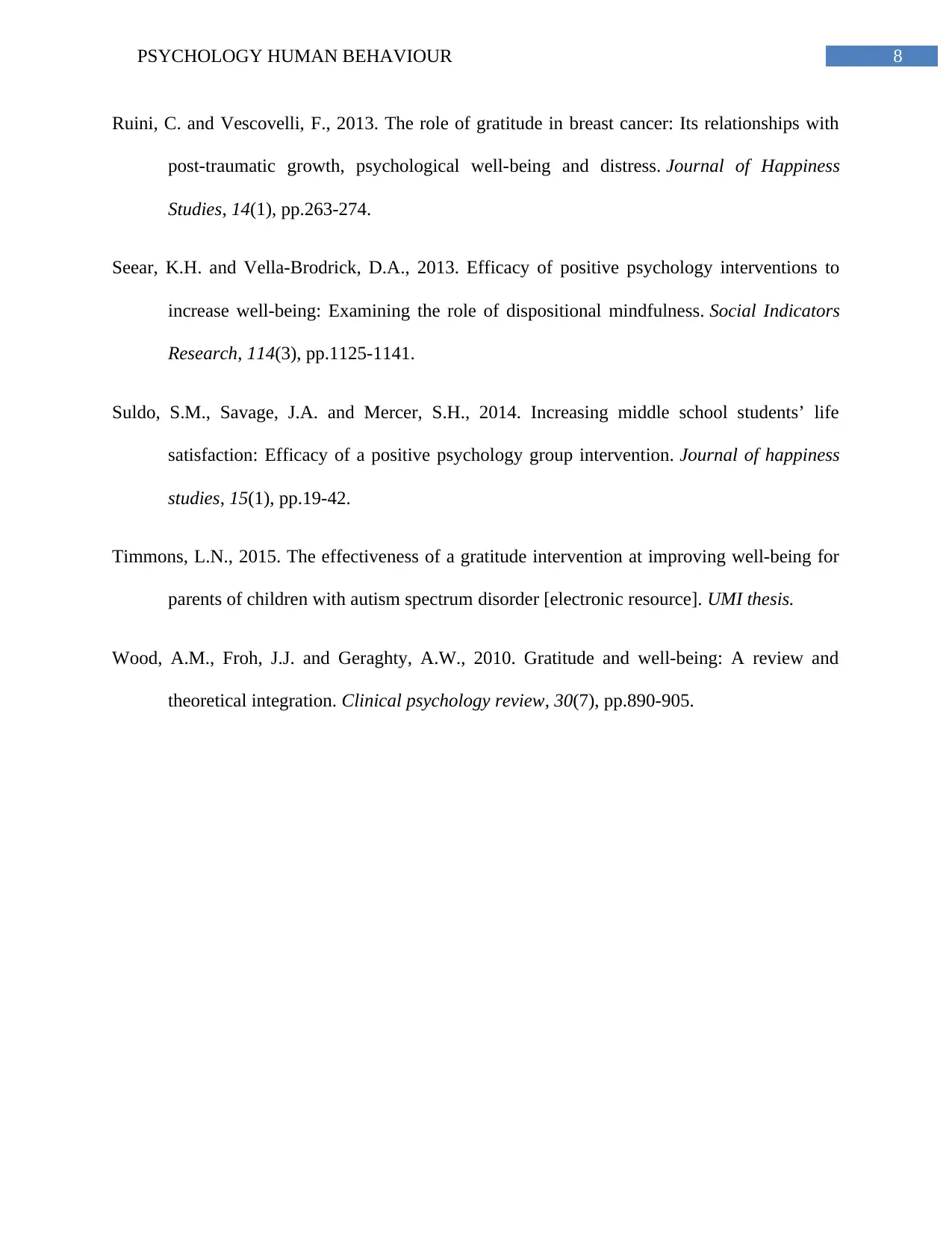
8PSYCHOLOGY HUMAN BEHAVIOUR
Ruini, C. and Vescovelli, F., 2013. The role of gratitude in breast cancer: Its relationships with
post-traumatic growth, psychological well-being and distress. Journal of Happiness
Studies, 14(1), pp.263-274.
Seear, K.H. and Vella-Brodrick, D.A., 2013. Efficacy of positive psychology interventions to
increase well-being: Examining the role of dispositional mindfulness. Social Indicators
Research, 114(3), pp.1125-1141.
Suldo, S.M., Savage, J.A. and Mercer, S.H., 2014. Increasing middle school students’ life
satisfaction: Efficacy of a positive psychology group intervention. Journal of happiness
studies, 15(1), pp.19-42.
Timmons, L.N., 2015. The effectiveness of a gratitude intervention at improving well-being for
parents of children with autism spectrum disorder [electronic resource]. UMI thesis.
Wood, A.M., Froh, J.J. and Geraghty, A.W., 2010. Gratitude and well-being: A review and
theoretical integration. Clinical psychology review, 30(7), pp.890-905.
Ruini, C. and Vescovelli, F., 2013. The role of gratitude in breast cancer: Its relationships with
post-traumatic growth, psychological well-being and distress. Journal of Happiness
Studies, 14(1), pp.263-274.
Seear, K.H. and Vella-Brodrick, D.A., 2013. Efficacy of positive psychology interventions to
increase well-being: Examining the role of dispositional mindfulness. Social Indicators
Research, 114(3), pp.1125-1141.
Suldo, S.M., Savage, J.A. and Mercer, S.H., 2014. Increasing middle school students’ life
satisfaction: Efficacy of a positive psychology group intervention. Journal of happiness
studies, 15(1), pp.19-42.
Timmons, L.N., 2015. The effectiveness of a gratitude intervention at improving well-being for
parents of children with autism spectrum disorder [electronic resource]. UMI thesis.
Wood, A.M., Froh, J.J. and Geraghty, A.W., 2010. Gratitude and well-being: A review and
theoretical integration. Clinical psychology review, 30(7), pp.890-905.
⊘ This is a preview!⊘
Do you want full access?
Subscribe today to unlock all pages.

Trusted by 1+ million students worldwide
1 out of 9
Related Documents
Your All-in-One AI-Powered Toolkit for Academic Success.
+13062052269
info@desklib.com
Available 24*7 on WhatsApp / Email
![[object Object]](/_next/static/media/star-bottom.7253800d.svg)
Unlock your academic potential
Copyright © 2020–2026 A2Z Services. All Rights Reserved. Developed and managed by ZUCOL.




